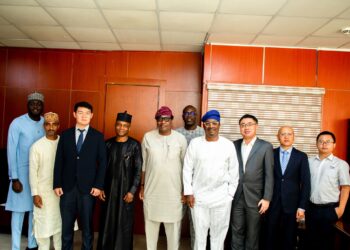As the United Kingdom – a country bound by deep history and connection with Nigeria- celebrates Black History Month, we are reminded that the story of Black excellence is not just about the past – it is about the future we choose to build.
I wrote a piece for the Law Society Scotland, inviting the readers to reimagine what inclusion, innovation, and leadership mean in today’s Scotland and the United Kingdom.
For me, as a proud Nigerian in the diaspora, this moment is both personal and purposeful. It is an opportunity which challenges me to rethink what leadership, inclusion, and innovation truly mean for Nigeria – a nation blessed with brilliance, yet constrained by old systems and divisions.
Diversity as Nigeria’s Untapped Advantage
From Lagos to Yenagoa, Kano to Enugu, our nation teems with talent, creativity, and resilience. Yet, too often, our leadership and institutions fail to reflect the richness of that diversity and inclusion.
Nigeria is a country of extraordinary diversity – of people, languages, and potential – it is more than WAZOBIA! Yet, this diversity is too often treated as a fault line rather than a foundation for progress. Our institutions, from politics to the private sector, still fail to reflect the full range of our national talent.
A quick look at the NSE-30 (NGX30), Nigeria’s top listed companies, reveals a concerning pattern: minimal gender representation, limited ethnic inclusion, and little generational balance in the board and senior leadership. The same narrow elite dominates both the public and private sectors, creating a cycle that excludes capable Nigerians from other backgrounds.
This is not just about fairness – it is about performance. Global evidence shows that diverse leadership drives better governance, transformation, innovation and profitability. When we shut out new perspectives, we stifle creativity, limit innovation, and weaken trust in our systems.
To move forward, Nigeria must see diversity and inclusion not as an obligation, but as a strategic advantage – one that strengthens our economy, politics, and society.
The Power of Diaspora Leadership
As someone from the Niger Delta with diverse experience and exposure, who works across the UK’s data and technology ecosystem, I’ve seen firsthand how Nigerians abroad are
thriving, driving change and leading across industries – from artificial intelligence and data science to law, finance, and education.
The Nigerian diaspora is not just a remittance engine; it is a reservoir of global experience and leadership. But that potential will only matter if it is connected back to national transformation. Nigeria must always see its diaspora as strategic partners, not spectators.
We can bridge this global-local divide by championing policies that encourage inclusion, knowledge transfer, diaspora investment, and public-private collaboration. The governance standards, inclusive leadership models and innovation frameworks that drive progress abroad can be adapted to suit Nigeria’s unique context.
Inclusion Is Strategy, Not Symbolism
True inclusion goes beyond representation – it is about recognition, empowerment and opportunity. Every Nigerian, regardless of gender, ethnicity, tribe, religion, or background, deserves the chance to contribute meaningfully to national progress.
In the UK, where I currently work and serve on governance boards, inclusion is seen not as charity but as strategy – a driver of both economic and social growth. Nigeria must embrace this mindset. We must invest in education, digital skills, creative industries and innovation ecosystems that open doors for women, youth, and underrepresented groups in the country.
Our diversity is not a weakness to be managed, it is a strength to be mobilised!
Innovation Begins with Mindset
Innovation is not just about technology; it starts with a mindset – with the courage to challenge the old and imagine the new. Whether in agriculture, health, finance or governance, innovation means finding new solutions to old problems, driven by data, information, ethics, and purpose.
Nigeria’s innovators and change makers must think globally but act locally, designing solutions that reflect our realities and scaling them responsibly. Innovation and transformation without accountability is disruption without direction; innovation and transformation guided by ethics and inclusion, however, becomes nation-building.
Leadership with Purpose, Not Position
Leadership is not about titles; it is about impact. What Nigeria needs today is strong and stable leadership that listens, serves, and unites – leadership that values competence over connection, and purpose over politics.
The next generation of Nigerian leaders, both at home and in the diaspora, must lead with humility, integrity and empathy. They must champion collaboration over competition and inclusion over exclusion. Only then can leadership truly reflect service to people, not power.
A Call to Reimagine Nigeria’s Future
The story of Nigeria is still unfolding. And every Nigerian, from Lagos to London, Yenagoa to York, Edinburgh to Port Harcourt, Aberdeen to Abuja, New York to Nsukka, has a role in shaping it.
Let us reimagine a renewed Nigeria where leadership is ethical, innovation is inclusive, and opportunity is borderless.
Because when Nigeria leads with integrity and imagination – the world pays attention!
The world is watching. The diaspora is ready. What remains is our collective courage – to transform, to include, and to lead with purpose.
About the Author
Abel Aboh is a UK-based Data and AI Leader and a governance board member of The Data Lab Scotland. He serves on the Nominations and Technology Law and Practice Committees of the Law Society of Scotland. Abel has over two decades of experience in data management, technology, human resources and governance.
A proud Nigerian from the Niger Delta (Delta and Bayelsa States), Abel is passionate about inclusive leadership, data, AI, education, finance, technology, trade, and empowering the next generation of African innovators and change makers.




















